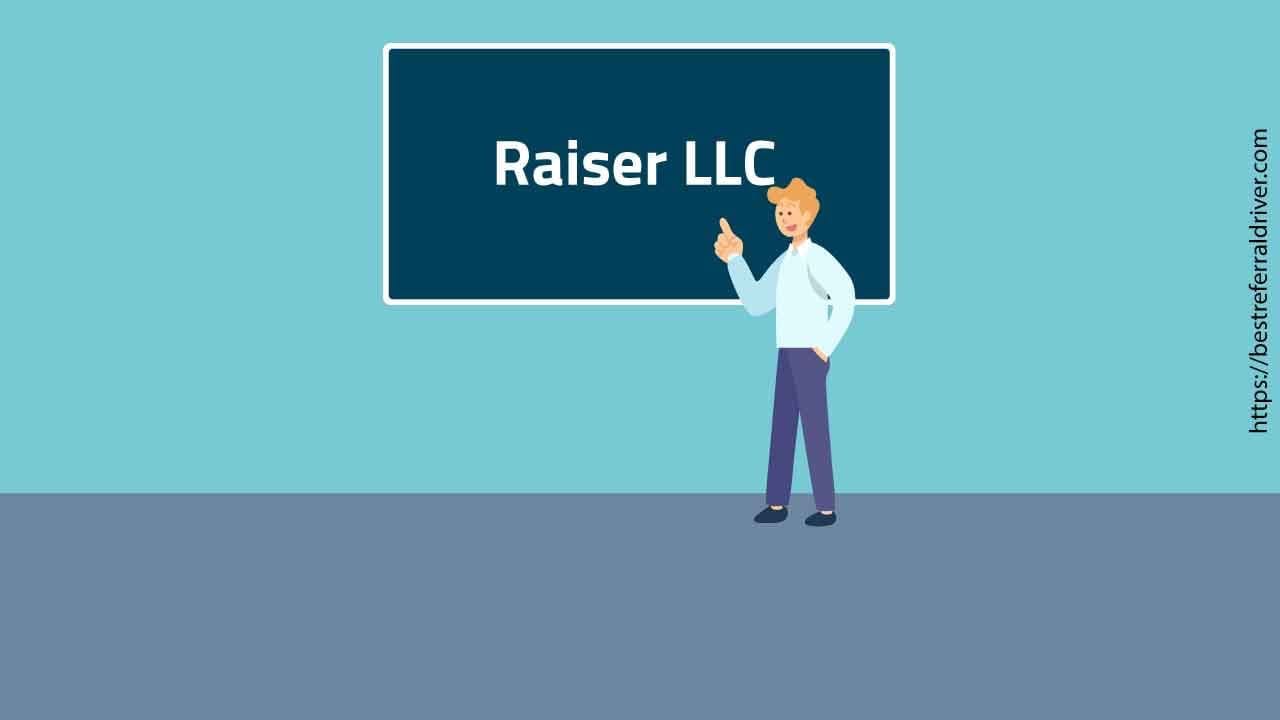Raiser EDI Payment -How Does Raiser LLC Affect Uber Drivers?


DISCLAIMER
All views and opinions expressed in this website are our own.
Bestreferraldriver.com is not affiliated
with, connected to or associated with Uber in any way.

Uber is one of the most popular ridesharing companies globally, with more than 93 million active users on its platform. However, the company has a unique operating system that confuses new drivers.
If you've signed up as an Uber driver, you've probably come across the term Raiser LLC multiple times while reading the terms and conditions. Besides that, drivers also receive in their bank accounts Raiser EDI payment and transactions from 'Raiser LLC' accounts while driving with the Uber app.
So, what exactly is the Raiser Uber relationship, and how does it affect Uber drivers? Read this detailed discourse on Uber EDI payment from Raiser LLC to find out.
If you have made the mistake of agreeing to the terms and conditions defined by Uber without reading every clause, you probably haven't noticed a recurring unfamiliar name in the content. However, Uber drivers who pay attention to the legalese must have noticed this name appears several times in the contract.
While Raiser might not be synonymous with Uber Technologies itself, it is an integral part of its legal and business structure.
Uber is the holding company and the parent of this business entity.
The rideshare company has to come up with multiple ways to protect itself from unwanted regulations and lawsuits.
A lot of businesses form LLC for separating the companies and personal assets, the business owners and the debts, the holding company and its subsidiary companies and provides a liability shield. A creditor cannot reach the assets of a subsidiary, nor the assets of the holding company. For example, a small business owner is struggling and has been unable to pay its creditors who can sue and reach the assets of the subsidiary, but not the assets of any other subsidiaries or the holding company.
Founded by Travis Kalanick in 2013, the organization was formed to handle the rising number of lawsuits filed against Uber. The firm deals with all Uber users and Uber drivers who file a lawsuit and represents the people injured in accidents involving an Uber ride.
If we simplify the complexity of Uber's corporate structure, Uber is the leading holding company while Raiser LLC is its wholly-owned subsidiary. Apart from lawsuits, the LLC formation also handles payment transactions and insurance legalities for Uber drivers.
Nevertheless, if you're receiving the Raiser 6795 EDI payment as an Uber driver, you're probably confused about its origin. Why did Uber International have to create a company to facilitate its operations? The section below will provide further insight.
To understand the purpose of Raiser LLC and the role it plays for the parent company and Uber drivers, it is vital to know the specific corporate structure followed by Uber. Unlike other corporations, Uber does not treat its drivers as employees.
Instead, Uber drivers are recruited and considered independent contractors who offer their services to the company. Mainly, this system is formulated to protect Uber from litigation for not providing contractor workers with essential benefits.
Although it is not illegal, this structure creates many issues, which lead to a plethora of lawsuits against the company. That's why Uber created the holding company structure, and a separate subsidiary, to deal with legal matters that hinder the company's operation.
Eventually, this stops Uber drivers or users from directly suing Uber. Instead, if they face wages, payments, or employment status issues, they will have to file class-action lawsuits against Raiser LLC.
Additionally, the Raiser Uber also plays an essential role in the taxation system for Uber drivers. While filing for tax returns, they will have to obtain a 1099 from Raiser LLC to accurately pay their income taxes on the wages they earned as Uber drivers.
Apart from dealing with class-action lawsuits filed by many Uber drivers, Raiser LLC also faces lawsuits from Uber passengers. For example, if a passenger faces negligence or severe injuries during their Uber ride, they can also sue Raiser LLC.
However, the compensation depends on the worth of your case as a passenger. This value depends upon multiple variables, including the following clauses:
To save itself from getting bombarded with litigation from passengers and users, Uber has devised a unique business system. While many subsidiaries manage various aspects of Uber business operations, Raiser LLC is solely responsible for handling Uber lawsuits.
If you're working as an Uber driver, here is how this role will affect you if you were to file a case against your employers.
As mentioned, you will have to go through Raiser LLC while filing a lawsuit against Uber. Even if you're driving for the company and are registered on the app, you won't be able to sue the company directly according to the terms of their employment contract.
On the contrary, you'll have to sue Raiser LLC and receive compensation from the subsidiary owned by Uber.
Even though Raiser LLC technically employs Uber drivers, they cannot contact the company directly if they face issues on the job. So, for example, in case of payout issues and app malfunction, you'll have to connect with the Uber support team.
However, if you have queries or problems regarding your taxation or payment statement, your issues will be directed towards Raiser LLC. You can draft an email defining your issue and send it to payments@raiser.com.
This way, you will get prompt replies from the subsidiary explaining any Raiser EDI payment issues or taxation problems.
If you're an Uber driver, you should know that you're directly involved in the Raiser LLC-Uber relationship. While working for Uber, you are also employed as an independent contractor for Rasier LLC.
Uber and Lyft drivers are, by default, classified as sole proprietors.
Technically, you're landing your part-time gigs and getting paid through the app, but legally, you are not an employee. This concept has a significant impact on your payment and taxation process. You cannot legally sue Uber for not providing primary employee benefits such as health insurance and paid leaves.
Besides that, you aren't affiliated with Uber but with the separate subsidiary company. So, if you or your passenger chooses to sue Uber, you'll be dealing with Raiser LLC by default.
If you're actively working as a driver with Uber, the Raiser LLC-Uber relationship is evident on the paycheck you receive from the organization.
For Uber drivers asking why Raiser is mentioned on their paycheck, the answer is simple. Even though you're driving with the Uber driver app, you are paid by its wholly-owned subsidiary.
Additionally, another confusing concept for Uber drivers is Raiser LLC EDI Payments. Mainly, these are payments made by Raiser to settle class-action lawsuits.
Although some drivers report receiving Raiser EDI payments even when they haven't filed any lawsuit these cases are rare. However, if you have ever filed a lawsuit against a passenger while driving with Uber, it will probably take a long time to resolve. That's why, when you receive an Uber EDI payment with your monthly pay statement, you might not realize what it's for.
Furthermore, an Uber EDI payment also appears on your payout statement if you receive a promotion payment during the month. Mostly promotional payments are listed as 'promotions' on your paycheck. But, sometimes, if you get a promotion and your payment gets delayed, you might receive it later as Raiser LLC EDI payments.
Apart from your payment statement, another place you'll notice Raiser mentioned is on your tax statement. If you're not aware of the relationship between Uber and Raiser, this might seem quite confusing to you.
However, the reason for Raiser's appearance on your payment statement, EDI payment, and tax information is the same. Besides being Uber's intermediary for lawsuits, Raiser also helps distribute payments to its drivers.
This way, legally, Uber is not paying you directly, but through another company it owns. That's what the taxation company considers and enters into your taxation statement. So, if you're paying taxes on your Uber income, Raiser will inevitably be mentioned on your tax documents.
Uber has a variety of other subsidiaries besides Raiser LLC. These subsidiaries help the company expand to new markets and protect against unwanted lawsuits and troublesome regulations.
Additionally, some of its subsidiaries also help Uber experiment with other services to increase its global reach and revenue. Furthermore, like Raiser LLC handles its legal matters, other subsidiaries take care of other business operations on its behalf.
Apart from companies like Raiser LLC, which Uber acquired, the ridesharing company has many self-created subsidiaries. These companies serve a purpose in the rideshare company's interest and fulfill multiple legal functions on its behalf.
If you're thinking of working with Uber, knowing about its various subsidiaries and their functions is a good idea. This way, you can quickly identify any shady aspects of your transactions and taxation related to Uber and solve any legal issues you want through the proper channel.
You can take a look at our complete guide to Uber subsidiaries , here is a short list of other companies owned by the holing:
Now that you've gone through our discourse regarding the Uber LLC, we've probably cleared the mist regarding the topic. However, if you're still confused about how Uber and Raiser LLC are related and what Raiser EDI payments are, here are the answers to some common FAQs.
Yes, all Uber drivers working in the US technically work for Raiser LLC.
That's why they receive their payments, promotions, and taxation details through Raiser LLC. Similarly, if they wish to sue their employers, their lawsuits will be directed towards LLC companies, not Uber.
However, if you're driving for Uber outside the US, the company might hire you through a different subsidiary.
In any case, the situation remains the same. You will be treated as a private contractor and will be paid through another company, not Uber itself.
Knowing that Raiser LLC handles the legal wing of the Uber company, you might need to contact them during emergency circumstances.
While there is no direct contact number available for Raiser LLC, you can mail them your queries or any legal documents you wish to serve on their address. The official address is 1455 Market St. San Francisco, CA 94103.
The tax ID of Raiser is 80-0896455.
Rasier LLC is an Uber subsidiary responsible for handling legal issues and disputes. Besides that, the company also acts as an intermediary between Uber and its contractor workers. That's why, as a driver it is common to see Raiser EDI payments and other aspects mentioned on your payout statement and taxation details.
While it is not new for significant corporations like Uber to have multiple subsidiaries to handle various business aspects, the San Francisco headquartered company shares a unique relationship with Raiser LLC.
As a driver using the Uber driver app, you should make sure to read the fine print while agreeing to Uber's terms and conditions. This way, you'll know your legal rights as independent contractors for a holding company before signing up for the job.

We provide the best resources and information for the major ridesharing, bike sharing, kids sharing and delivery companies. Best Doordash promo code, Lyft driver Promo code and Postmates Referral code. Sign up at 100% working and they will give you the best sign up bonus at any given time.
Get up to $50 in Lyft Credit with our coupon code
LYFT Rider promotion
Become a Dasher! Sign up and deliver with Doordash
DoorDash Promo